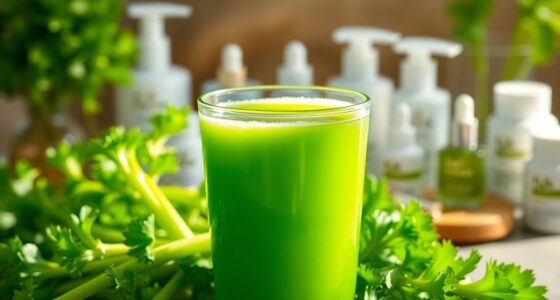You won't believe the incredible benefits of eating aloe vera! It boosts your skin health, enhances digestion, and can even regulate blood sugar levels. This succulent is packed with vitamins and antioxidants that aid in overall wellness. Regular consumption can improve skin elasticity and soothe digestive disorders like IBS. Just be cautious of potential side effects, and make sure to choose the right products. Discover even more amazing perks of incorporating aloe vera into your diet next!
Key Takeaways
- Aloe vera is rich in vitamins and minerals, promoting overall wellness and enhancing nutrient intake effectively.
- It aids in digestion by relieving constipation and supporting beneficial gut flora for improved gut health.
- The anti-inflammatory properties of aloe vera help heal burns and improve skin appearance and elasticity.
- Regular consumption may boost immunity and provide antioxidant protection against oxidative stress.
- Caution is advised due to potential side effects; consult a healthcare professional before including it in your diet.
What Is Aloe Vera and How Is It Used?

Aloe vera is a remarkable succulent known for its thick, gel-like inner leaf, packed with vitamins, minerals, and enzymes that can enhance your health.
This plant's gel isn't just soothing for burns but can also be consumed as juice or in supplements. The aloe vera leaf contains over 75 active compounds, including antioxidants that may protect your body from oxidative stress. Aloe vera's soothing properties have also been recognized for their potential to reduce inflammation and swelling.
When prepared properly, the gel is safe for consumption and offers various potential health benefits. Many people use aloe vera to improve digestive health, lower blood sugar levels, and enhance skin appearance.
The Nutritional Profile of Aloe Vera

When you look at aloe vera's nutritional profile, you'll find it's a low-calorie drink packed with essential minerals.
An 8-ounce serving offers valuable nutrients like calcium, sodium, and potassium, while also containing beneficial antioxidants. This unique combination contributes to its health benefits, making it a great addition to your diet. Additionally, the stress-relieving benefits of aloe vera can complement other holistic practices like aromatherapy for overall wellness.
Nutrients in Aloe Vera
While you might think of aloe vera primarily for its soothing properties, its nutritional profile offers a range of benefits that can enhance your diet. Drinking aloe vera juice is a low-calorie way to boost your intake of essential nutrients. Each 8-ounce serving packs a punch with minerals like calcium and potassium, which support bone health and muscle function. Plus, the dietary fiber aids in digestion, promoting gut health. Additionally, the antioxidants found in aloe vera may help combat oxidative stress, further enhancing its health benefits.
Here's a quick look at the nutrients in aloe vera juice:
| Nutrient | Amount per 8 oz |
|---|---|
| Calories | 10 |
| Calcium | 74 mg |
| Potassium | 110 mg |
| Dietary Fiber | 1 g |
Stay hydrated while enjoying these benefits!
Health Benefits Overview
Discovering the myriad health benefits of aloe vera can enhance your overall well-being. This low-calorie option, with just 10 calories per 8-ounce serving, packs a punch with essential nutrients.
Aloe vera juice is rich in calcium, providing 74 milligrams to support bone health and metabolic functions, while its potassium content of 110 milligrams aids in heart health and blood pressure regulation.
With over 75 active compounds, including vitamins, minerals, enzymes, and amino acids, aloe vera offers impressive health benefits. Its anti-inflammatory properties can notably promote skin healing and improve digestive health. Additionally, the presence of antioxidants in aloe vera can help boost immunity and further enhance its health benefits.
Incorporating aloe vera into your diet is an easy way to boost your nutrient intake and enjoy its remarkable health benefits.
Potential Benefits of Drinking Aloe Vera Juice

Drinking aloe vera juice might be a game-changer for your digestive health, helping to ease issues like bloating and constipation.
It may also play a role in regulating blood sugar levels, especially if you're dealing with pre-diabetes.
Plus, its soothing properties can offer relief for various skin conditions, making it a versatile addition to your wellness routine.
Digestive Health Improvement
If you're looking for natural ways to boost your digestive health, aloe vera juice might be worth considering. This wonder plant contains anthraquinone glycosides, which can provide laxative effects to relieve constipation.
Preliminary research suggests that it may help manage symptoms of gastrointestinal reflux disease (GERD) and irritable bowel syndrome (IBS), offering potential relief. The soothing effects of aloe vera can benefit your digestive tract, promoting smooth functioning of digestive organs.
Additionally, regular consumption may enhance gut health by supporting beneficial gut flora. Aloe vera juice also contains vitamins and minerals that nourish hair follicles, which can contribute to overall wellness. However, it's essential to consult with a healthcare professional before diving in, as excessive intake might lead to side effects like cramps and diarrhea.
Enjoying aloe vera in moderation can be a smart choice for your digestive wellness.
Blood Sugar Regulation
While managing blood sugar levels can be challenging, incorporating aloe vera juice into your routine might offer some benefits. Research studies show that aloe vera can potentially aid in diabetes management, particularly for those with pre-diabetes. Older studies suggested it may lower fasting blood sugar levels in individuals with type 2 diabetes, although results have been mixed. Additionally, regular consumption of green tea may further support cognitive function, which is essential for overall health management.
| Condition | Aloe Vera Effect | Research Outcome |
|---|---|---|
| Type 2 Diabetes | Limited impact on fasting blood sugar | Mixed results in studies |
| Pre-Diabetes | Improved blood sugar levels | Positive outcomes in studies |
| Fasting Blood Sugar | Potential benefits | Requires more research |
| Health Benefits | Emerging evidence | Need for randomized controlled trials |
| Supplements | Not standardized | Consult a healthcare professional |
Consider this within your overall health strategy.
Skin Condition Relief
Aloe vera juice offers potential relief for various skin conditions, thanks to its anti-inflammatory properties.
When consumed as oral aloe vera gel, it can enhance collagen production, benefiting skin elasticity and reducing wrinkles, especially in women over 40. Daily intake of aloe sterol has shown to improve skin elasticity in men under 46, highlighting its advantages for youthful skin.
While topical application of aloe vera is widely recognized for treating burns, acne, and psoriasis, drinking the juice might also yield significant benefits. Additionally, aloe vera contains antioxidants that could protect your skin from oxidative stress. Moreover, chia seeds are another nutrient-rich option that can contribute to overall skin health and hydration.
However, more human trials are needed to fully establish the effectiveness of oral aloe vera for skin health.
Aloe Vera for Skin Health and Appearance

When it comes to enhancing your skin health and appearance, aloe vera offers a wealth of benefits that can't be overlooked. Its anti-inflammatory properties make it effective for treating burns and various skin disorders through topical application. Additionally, studies suggest that oral aloe vera can boost collagen production and improve skin elasticity, particularly for women over 40, promoting skin rejuvenation.
| Benefit | Description |
|---|---|
| Skin Disorders | Helps treat various skin issues |
| Collagen Production | Enhances skin elasticity and reduces wrinkles |
| Active Ingredients | Contains over 75 components for skin health |
| Anti-Inflammatory | Reduces redness and swelling |
Incorporating aloe vera into your routine could greatly improve your skin appearance and overall health!
Aloe Vera's Role in Digestive Health

Digestive health is essential for overall well-being, and incorporating aloe vera into your diet can offer notable benefits.
Aloe vera juice contains anthraquinone glycosides, which may provide constipation relief due to their natural laxative effects. Preliminary research suggests that it could help with gastroesophageal reflux disease and irritable bowel syndrome, but more studies are needed for conclusive evidence.
The anti-inflammatory fatty acids in aloe vera may also aid digestion and support smooth functioning of your digestive organs. However, individual responses can vary, so it's important to monitor how your body reacts.
Additionally, natural remedies like aloe vera can complement conventional treatments for digestive issues. Always consider the safety of aloe vera, as excessive intake might lead to gastrointestinal issues like cramps and diarrhea. Enjoy aloe vera responsibly for its potential health benefits!
The Impact of Aloe Vera on Blood Sugar Levels

While managing blood sugar levels can be challenging, incorporating aloe vera into your routine might offer some support.
Research indicates that consuming aloe vera gel or juice may lower fasting blood sugar levels, particularly in individuals with pre-diabetes. A study found that pre-diabetes patients who consumed aloe juice experienced notable improvements in both blood sugar and fatty acid levels, showcasing its potential benefits as a supportive treatment.
However, while some reviews showed no significant impact on fasting blood sugar for type 2 diabetes patients, the effects on pre-diabetes cases appear promising.
Keep in mind, limited research exists, and larger clinical trials are necessary to confirm aloe vera's efficacy for blood sugar control. Always consult a professional before trying new supplements.
Risks and Side Effects of Aloe Vera Consumption

Although aloe vera is often praised for its health benefits, it’s important to recognize the potential risks and side effects associated with its consumption. You might experience several issues, especially if you exceed recommended dosages: Some individuals may experience gastrointestinal discomfort, such as diarrhea or cramps, when consuming too much aloe vera. Furthermore, excessive intake can lead to imbalances in electrolytes, which may pose serious health risks. Despite these concerns, many people are drawn to the hidden benefits of aloe vera drink, as it can support digestion and provide hydration when consumed in moderation.
- Diarrhea, cramps, and vomiting
- Kidney damage and electrolyte imbalance
- Allergic reactions like skin irritation
Aloe vera latex, found in the outer leaf, poses serious health risks and has been banned by the FDA for over-the-counter sales.
If you have digestive disorders or are pregnant, you should avoid it altogether. Additionally, those on diabetes, heart, or kidney medications need to be cautious, as interactions can lead to significant health issues.
Always consult a healthcare provider before trying aloe vera to guarantee your safety.
How to Safely Incorporate Aloe Vera Into Your Diet

Incorporating aloe vera into your diet can be beneficial, but it's essential to do so safely. Start with aloe vera gel from the inner leaf, which is safe to eat. Make sure to wash it thoroughly to remove any harmful latex residue.
Begin by consuming aloe vera in small amounts, like 1-2 tablespoons daily, to monitor your reaction and avoid gastrointestinal discomfort. Choose products specifically labeled for dietary use, as many commercial gels aren't meant for consumption.
Always consult a healthcare professional before adding aloe vera to your diet, especially if you're pregnant, nursing, or taking medications.
Finally, limit aloe vera latex, as high doses can lead to serious side effects and are banned in over-the-counter laxatives.
Frequently Asked Questions
What Happens if We Eat Aloe Vera Daily?
If you eat aloe vera daily, you might notice various health benefits. It can help lower your blood sugar levels and improve insulin sensitivity, which is great for pre-diabetes management.
You may also experience relief from constipation due to its natural laxative properties. Additionally, regular intake could boost your antioxidant levels, enhance collagen production, and improve skin elasticity.
However, be cautious; excessive consumption can lead to stomach cramps and other issues.
Does Aloe Vera Clean Out Your System?
Isn't it intriguing how some plants can impact our health? Aloe vera can help clean out your system, primarily due to its natural laxative properties.
However, you should be cautious; excessive use can lead to cramps and diarrhea, which isn't the goal, right? While it may aid digestion, the FDA doesn't approve it for over-the-counter laxatives anymore.
What Does Aloe Vera Do to a Woman's Body?
Aloe vera can offer several benefits for your body. It may enhance your skin's appearance by boosting collagen production and reducing wrinkles.
If you're managing blood sugar levels, aloe vera might help lower fasting blood sugar. Its antioxidants could protect against oxidative stress, while its anti-inflammatory properties can aid in treating skin issues like acne and minor burns.
Additionally, you might find relief from digestive issues like GERD or IBS with aloe vera.
What Are the Benefits of Eating Raw Aloe Vera?
Eating raw aloe vera can offer several benefits. It may help lower your blood sugar levels and boost insulin sensitivity, which is great if you're managing pre-diabetes.
The antioxidants in aloe vera protect your body from oxidative stress. Regular consumption could also enhance your memory and alleviate depressive symptoms.
Plus, using it as a mouthwash can reduce dental plaque, promoting better oral health. Just make sure you prepare it properly for safe consumption.
Conclusion
So, if you're ready to transform into a glowing, healthy version of yourself, just grab that aloe vera! Who needs a gym when you can sip on this miracle juice and watch your skin shine like a disco ball? And don't worry about the occasional tummy upset—it's just your body's way of saying, "Thanks for the cleanse!" Immerse yourself in the aloe craze; after all, who wouldn't want to feel like a walking health magazine? Cheers to your new leafy obsession!
Cindy thoroughly researches juicing trends, techniques, and recipes to provide readers with practical advice and inspiration. Her writing style is accessible, engaging, and designed to make complex concepts easy to understand. Cindy’s dedication to promoting the advantages of juicing shines through her work, empowering readers to make positive changes in their lives through the simple act of juicing.











